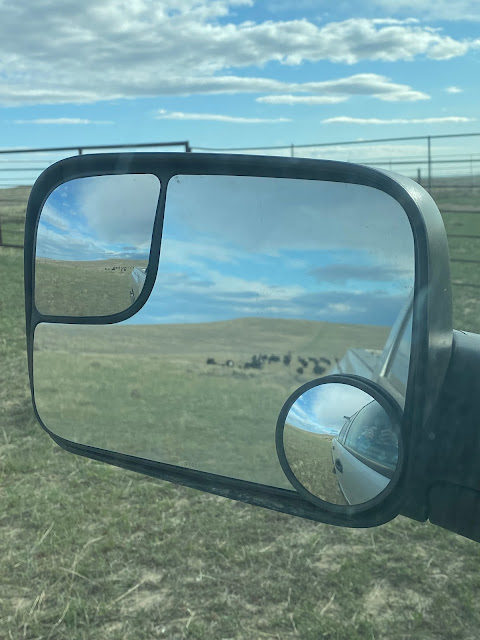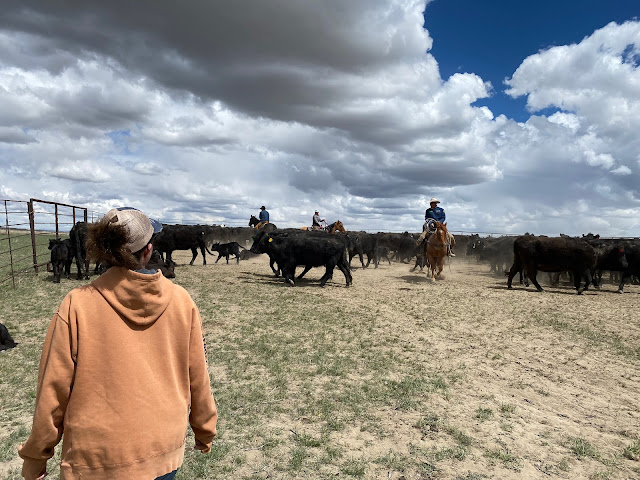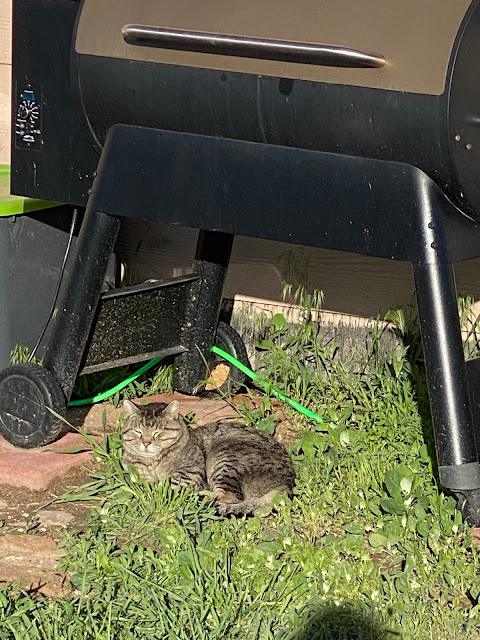Truly, a day worth celebrating:
Ostensibly exploring the practice of law before the internet. Heck, before good highways for that matter.
Tuesday, August 8, 2023
Monday, August 7, 2023
Wednesday, August 2, 2023
Tuesday, July 25, 2023
Packed cattle in high heat?
Yesterday I drove home from a remote location. It was a really hot day. All the cattle that I drove past were packed up in dense groups, crowded for the most part near fences, but at least all packed up. What was up with that?
Saturday, July 1, 2023
Sunday, July 1, 1923. Chinese exclusion and untimely death.
For those who may have followed yesterday's drama about a policeman (actually sheriff's officer) shooting into a car that refused to dim its headlights, the story plays out today:
The Chinese Immigration Act, which we posted about earlier, and which banned Chinese immigrants from entering Canada, save for a few exceptions, came into effect.
A Rin Tin Tin movie was released.
Friday, June 30, 2023
The Steer. 1942.
Saturday, June 24, 2023
Blog Mirror: Trout: From Elite Sport Fish to Global Aquaculture
With a few comments from me on the linked in blog:
Trout: From Elite Sport Fish to Global Aquaculture
Wednesday, June 7, 2023
Thursday, June 7, 1923.
Saturday, June 3, 2023
2023. The Second Branding
2023. The First Branding
Monday, May 29, 2023
Ranch Yard Lion
Saturday, May 27, 2023
Friday, May 5, 2023
Misplaced Priorities
Vox: We Need to Consider the Suffering of the Unborn (Chickens)
But not that human fetuses feel pain?
Friday, April 14, 2023
18,000
That's the number of cattle killed in the explosion in Texas. 18,000 dairy cattle.
That's obscene.
I own cattle, and beef cattle at that. But this shows what's really gone wrong with the United States and the Western World. Everything has to be some sort of factory.
Lex Anteinternet: What's wrong with the (modern, western) world, part 3. Our lost connection with animals.
ICELANDIC MILKMAID ON HER MORNING ROUND
This is a fine, sturdy pony standing so stockily for his photograph, and he can make light of his burden of buxom beauty with her heavy can of milk. She cares not for saddle or stirrups, for most of these island people are born to horseback, and her everyday costume amply serves the purpose of a riding-habit for this strapping Viking's daughter, with her long tresses shining in the breeze.
(Original caption, of interest here I wouldn't call this young lady "buxom" or "strapping", but just healthy. This might say something about how standards have changed over time.)
The other day, I posted this in a footnote on a completely different topic.
Lex Anteinternet: What's wrong with the (modern, western) world, par...:
4. One of the odder examples of this, very widespread, is the change in our relationship with animals.Our species is one of those which has a symbiotic relationship with other ones. We like to think that this is unique to us, but it isn't. Many other examples of exist of birds, mammals and even fish that live in very close relationships with other species. When this occurred with us, we do not know, but we do know that its ancient. Dogs and modern wolves both evolved from a preexisting wolf species starting some 25,000 to 40,000 years ago, according to the best evidence we currently have. That likely means it was longer ago than that.Cats, in contrast, self domesticated some 7,000 or so years ago, according to our best estimates.Cat eating a shellfish, depiction from an Egyptian tomb.We have a proclivity for both domesticating animals, and accepting self domestication of animals, the truth being that such events are likely part and parcel of each other. Dogs descend from some opportunistic wolves that started hanging around us as we killed things they liked to eat. Cats from wildcats that came on as we're dirty. Both evolved thereafter in ways we like, becoming companions as well as servants. But not just them, horses, pigs, sheep, cattle. . .the list is long.As we've moved from the natural to the unnatural, we've forgotten that all domestic animals, no matter how cute and cuddly they are, are animals and were originally our servants. And as real children have become less common in WASP culture, the natural instinct to have an infant to take care of, or even adore, has transferred itself upon these unwilling subjects, making them "fur babies".It's interesting in this context to watch the difference between people who really work with animals, and those who do not. Just recently, for example, our four-year-old nephew stayed the night due to the snow, and was baffled why our hunting dog, who is a type of working dog but very much a companion, stayed the night indoors. The ranch dogs do not. . . ever. The ranch cats, friendly though they are, don't either.
Saturday, April 1, 2023
Going Feral: Governor Convenes Pinedale Town Hall to Discuss Wildlife Losses
Governor Convenes Pinedale Town Hall to Discuss Wildlife Losses
Governor Convenes Pinedale Town Hall to Discuss Wildlife Losses
CHEYENNE, Wyo. – This winter has been one of the hardest winters Wyoming has experienced in recent history. According to temperatures recorded at the Pinedale airport, the 30-year average for days of temperatures below zero is approximately 39 days. This year, there were 62 days below-zero temperatures. Compounding the winter conditions has been an unusually large amount of snow, with many areas currently at 125-150% of the average snowpack. These factors have severely impacted Wyoming wildlife, and concerns from the public have grown as antelope, and deer carcasses have become substantially visible.
In response to the growing concerns Governor Gordon heard from constituents and legislators, the Governor called for a town hall meeting to provide an opportunity to hear directly from citizens in areas most impacted and to discuss solutions that work for Wyoming wildlife. The town hall was held at the Pinedale library and was open to the public through Zoom.
Joining Governor Gordon and Wyoming Game and Fish Department (WGFD) Director Brian Nesvik was Dr. Kevin Montieth, a professor at the University of Wyoming’s Haub School of Environment and Natural Resources. Dr. Monteith shared with the audience that in addition to tougher than usual winter conditions, antelope have been hit hard by a rare bacterial pneumonia, which appears to be spreading.
Dr. Monteith further explained that some solutions that have been called for, such as feeding antelope and mule deer, are not good solutions because, unlike elk, the digestive systems of these animals cannot quickly adjust to hay. Monteith explained to an audience of more than 200 that the best solution to help Wyoming wildlife is protecting and enhancing the animals’ habitat and protecting migration routes so animals can more easily seek forage. Access to their natural foods over the summer and fall allows the animals to enter winter with higher body fat content, helping them survive winter when shrubs and sagebrush brush are scarce.
Governor Gordon and Director Nesvik heard many suggestions, including limiting hunting quotas and seasons this year. Director Nesvik explained that this is an ongoing evaluation, and the WGFD continually monitor all the factors, taking them into account in future decisions. “We are experiencing one of the toughest winters for big game in Wyoming’s recent history,” noted Director Nesvik. We have difficult decisions to make, and I appreciate everyone who came to our town hall. Rest assured; those tough decisions will be made in consideration of biology and the advice we hear from concerned citizens.”
Concluding the town hall, Governor Gordon stated, “I thank all who came to the town hall in person or virtually. Wyoming people care deeply about our wildlife. That was clearly shown today. I greatly appreciate all the suggestions, questions and comments they shared today. Wyoming folks are not shy. I am committed to working with our citizens to provide healthy wildlife populations for generations to come.”
A Zoom recording of the town hall can be viewed here.
Friday, March 31, 2023
Foothill Agrarian: Once a Sheepman...
Friday, March 24, 2023
Blog Mirror: These German soldiers and their mules have achieved all my relationship goals
These German soldiers and their mules have achieved all my relationship goals
Monday, March 6, 2023
Tuesday, March 6, 1923. The Halibut Treaty. Formation of the Egyptian Feminist Unioin (الاتحاد النسائي المصري), Irish blood borthers.
Canada and the United States signed the Convention for the Preservation of Halibut Fishery of the Northern Pacific Ocean, referred to commonly as the "Halibut Treaty". It was the first treaty Canada signed without involving the United Kingdom. The environmental treaty was a pioneering treat regulating the fishing of halibut.
Halibut are just about the tastiest fish ever.
But, in reality, Monday through Friday I'll be in my office.
On the same day, German Chancellor Cuno told the Reichstag, smarting over the Belgian and French (the Belgian part is typically forgotten) armed occupation of the Ruhr, that Germany would not negotiate with the French directly, but only through an intermediary.
While the French and Belgian occupation of the Ruhr is now nearly universally condemned, it should be recalled that the two Francophone countries had seen substantial armed occupation at the hands of a non-repentant Germany, which in both instances had killed civilians in ways that would foreshadow the Second World War. Had the French simply remained in the Ruhr, it might be recalled, or enforced their treaty rights at the time that the Germans under Hitler reoccupied it, the Second World War would not have occurred.
British Prime Minister Bonar Law, for his part, was being pressured on the same day to form a more definitive stance to the situation.
The Egyptian Feminist Union (الاتحاد النسائي المصري), was founded at the home of Egyptian activist Huda Sha'arawi.
تأسس الاتحاد النسائي المصري في منزل الناشطة المصرية هدى شعراوي.
It still exists.
Five Irish soldiers were killed by a Republican booby trap at Baranarigh Wood in Kerry. The following day a bloody reprisal was carried out by the Free State against nine IRA prisoners.
Pilots of the United States Army Air Corps posed for this photograph:
Friday, February 17, 2023
Blog Mirror: Gila National Forest moves forward with lethal removal of feral cattle from Gila Wilderness
Gila National Forest moves forward with lethal removal of feral cattle from Gila Wilderness
Release Date: Feb 16, 2023
Area Closure begins Feb. 20, 2023
The Gila National Forest has issued a decision to remove feral cattle within the boundaries of the Gila Wilderness using lethal methods. These feral cattle are not domesticated animals and pose a significant threat to public safety and natural resources. A closure order covering the area of operations will go into effect on Monday, Feb. 20, and aerial shooting will commence from Thursday, Feb. 23 through Sunday, Feb. 26. For public safety, Gila National Forest officials are asking people to avoid the closure area while the order is in effect.
“This has been a difficult decision, but the lethal removal of feral cattle from the Gila Wilderness is necessary to protect public safety, threatened and endangered species habitats, water quality, and the natural character of the Gila Wilderness,” said Camille Howes, Gila National Forest Supervisor. “The feral cattle in the Gila Wilderness have been aggressive towards wilderness visitors, graze year-round, and trample stream banks and springs, causing erosion and sedimentation. This action will help restore the wilderness character of the Gila Wilderness enjoyed by visitors from across the country.”
The Gila National Forest is working with USDA Animal and Plant Health Inspection Service (APHIS) Wildlife Services to remove feral cattle from within the boundaries of the Gila Wilderness. Due to the terrain, their numbers are challenging to determine but the best estimate is that there are approximately 150 head of cattle. The most efficient and humane way to deal with this issue is with the responsible lethal removal of the feral cattle.
Some cattle growers have expressed concern that branded cattle could have strayed into the Gila Wilderness over the past year, due to fences and water gaps that were damaged during an unusually strong monsoon season. The Forest Service is committed to continued efforts toward collaborative solutions and will continue to coordinate with permittees in their efforts to locate, gather, and remove their branded cattle from areas where they are not authorized.
All dispatched cattle will be left onsite to naturally decompose. Forest Service staff will ensure no carcasses are adjacent to or in any waterbody or spring, designated hiking trail, or known culturally sensitive area. A wilderness minimum requirements decision guide has been completed and approved before using any methods otherwise prohibited under the Wilderness Act.
For additional information, visit the Gila National Forest website or contact Maribeth Pecotte at (575) 388-8211.
They should just allow them to be hunted.
























_Wolf.png)
.jpg)









